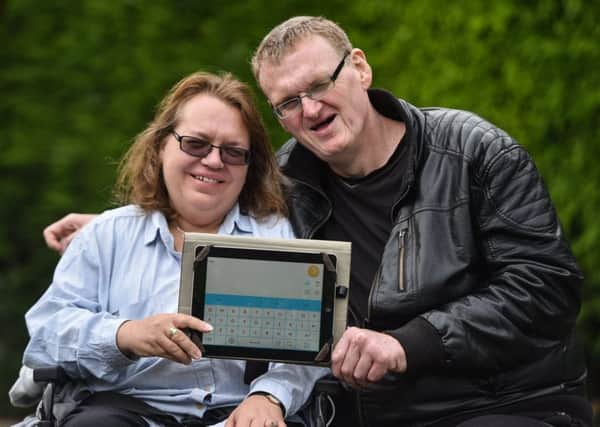Miracle of saying '˜I do' - Stephen Hawking-style voice technology will help terminally ill Leeds woman say her vows


Angela Brown, 48, from Rothwell, was diagnosed with the progressive bulbar palsy form of motor neurone disease (MND) in April and, such has been the speed with which the condition has taken hold, she now uses a wheelchair much of the time and cannot speak above a whisper.
But when she ties the knot with partner Tim Gates at Leeds Town Hall on Saturday, August 26, Angela is determined that she will walk down the aisle.
Advertisement
Hide AdAdvertisement
Hide AdShe will also pre-programme her wedding vows ahead of the big day so they can be played out through an iPad via a similar communication system to the one used by her fellow MND sufferer Professor Hawking.
And, in a show of can-do attitude typical of her defiant fight against her illness, she is hoping to summon up the strength to say the all-important words ‘I do’ herself.
Angela, who will be supported by her dad, David Robinson, for her walk down the aisle, said: “Given what we’ve all been through as a family over the last few months, it is going to be a poignant occasion, as well as a happy one. My speech is barely understandable to anybody now, although I can still hear my own voice in my thoughts and in my writing.
“I will keep battling to do the little things which now seem like big things and prove that no matter what MND throws at me, I am not about to call it a day just yet.
Advertisement
Hide AdAdvertisement
Hide Ad“There’s no getting away from it, MND is a terminal illness, but I do not want to give into it.”
Angela, who used to work as a learning support assistant at Leeds City College, was diagnosed with MND after developing a slurring in her speech.
People with progressive bulbar palsy have a life expectancy of between six months and three years from the onset of symptoms.
One of Angela’s daughters from a previous marriage, Victoria, 22, said: “My mum is my absolute hero and her strength is amazing.
Advertisement
Hide AdAdvertisement
Hide Ad“We are so lucky to live at a time when this voice technology is available, so my mum isn’t as trapped or lonely as she otherwise might be.
“MND is not all there is to live for. It will not be all we live for. It will be on the sidelines, making every joyous moment even sweeter for us.” Angela is writing about her experiences coping with MND on her blog, www.angie1926.wordpress.com.